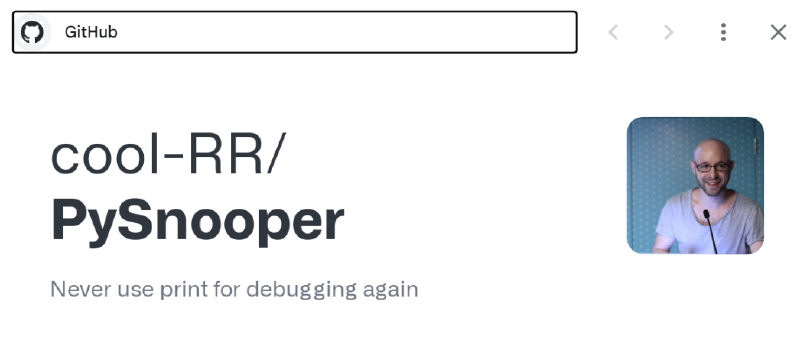为什么需要PySnooper?
在Python开发过程中,print调试法和断点调试法是最常用的调试手段。但面对复杂逻辑时,传统方法存在明显不足:
- print语句需要手动添加/删除,破坏代码整洁性
- IDE断点调试在远程服务器场景难以使用
- 多线程/异步场景调试困难
PySnooper通过智能日志记录机制,实现了零侵入式调试,提供了另一种直观、便利地观测调试手段
核心功能详解
1. 智能上下文追踪
比如我们编写一个递归函数
1
2
3
4
5
6
7
8
9
10
|
import pysnooper
@pysnooper.snoop()
def factorial(n):
if n == 1:
return 1
else:
return n * factorial(n-1)
factorial(3)
|
输出示例:
1
2
3
4
5
6
7
8
9
10
11
12
13
14
15
16
17
18
19
20
21
22
23
24
|
(.venv) C:\Chengxiaqiucao\AI
python ai_test.py
Source path:... C:\Chengxiaqiucao\AI\ai_test.py
Starting var:.. n = 3
20:14:50.353061 call 9 def factorial(n):
20:14:50.357038 line 10 if n == 1:
20:14:50.357103 line 13 return n * factorial(n-1)
Starting var:.. n = 2
20:14:50.357159 call 9 def factorial(n):
20:14:50.357220 line 10 if n == 1:
20:14:50.357291 line 13 return n * factorial(n-1)
Starting var:.. n = 1
20:14:50.357348 call 9 def factorial(n):
20:14:50.357421 line 10 if n == 1:
20:14:50.357460 line 11 return 1
20:14:50.357501 return 11 return 1
Return value:.. 1
Elapsed time: 00:00:00.000248
20:14:50.357716 return 13 return n * factorial(n-1)
Return value:.. 2
Elapsed time: 00:00:00.000649
20:14:50.357843 return 13 return n * factorial(n-1)
Return value:.. 6
Elapsed time: 00:00:00.005107
|
自动记录函数调用栈和代码执行路径,支持递归函数追踪
2. 变量监控
1
2
3
4
5
6
7
|
@pysnooper.snoop(watch=('result', 'len(data)'))
def process_data(data):
result = []
for item in data:
processed = item * 2
result.append(processed)
return sum(result)
|
监控特点:
- 支持表达式监控(如
len(data))
- 实时显示变量类型
- 数值变化提示
3. 上下文管理模式、输出到文件
1
2
3
|
# 上下文管理器模式
with pysnooper.snoop(output='/var/log/debug.log'):
critical_operation()
|
4. 多处跟踪时指定前缀
1
2
3
4
5
6
7
8
9
10
11
|
@pysnooper.snoop(prefix='[add]')
def add(a, b):
return a + b
@pysnooper.snoop(prefix='[main]')
def main():
result = add(5, 7)
return result
result = main()
print(f"Final result: {result}")
|
输出时会显示指定的不同前缀
1
2
3
4
5
6
7
8
9
10
11
12
13
14
15
16
|
[main]20:29:01.818895 call 17 def main():
[main]20:29:01.819578 line 18 result = add(5, 7)
[add] Source path:... C:\Chengxiaqiucao\AI\ai_test.py
[add] Starting var:.. a = 5
[add] Starting var:.. b = 7
[add] 20:29:01.819791 call 13 def add(a, b):
[add] 20:29:01.820558 line 14 return a + b
[add] 20:29:01.820758 return 14 return a + b
[add] Return value:.. 12
[add] Elapsed time: 00:00:00.001314
[main]New var:....... result = 12
[main]20:29:01.821253 line 19 return result
[main]20:29:01.821503 return 19 return result
[main]Return value:.. 12
[main]Elapsed time: 00:00:00.002834
Final result: 12
|
5. 设置跟踪深度
如果代码中牵涉多层函数调用,还可以通过指定记录深度,默认深度为 1,灵活结合depth参数,可以帮助我们重点查看关注部分
1
2
3
4
5
6
7
8
9
10
|
@pysnooper.snoop(depth=1)
def outer_function(x):
return inner_function(x + 1)
@pysnooper.snoop(depth=2)
def inner_function(y):
return y * 2
result = outer_function(10)
print(f"Outer function result: {result}")
|
输出:
1
2
3
4
5
6
7
8
9
10
11
12
13
14
|
Starting var:.. x = 10
20:37:49.360851 call 9 def outer_function(x):
20:37:49.361569 line 10 return inner_function(x + 1)
Source path:... C:\Chengxiaqiucao\ai\ai_test.py
Starting var:.. y = 11
20:37:49.361734 call 13 def inner_function(y):
20:37:49.362077 line 14 return y * 2
20:37:49.362184 return 14 return y * 2
Return value:.. 22
Elapsed time: 00:00:00.000589
20:37:49.362380 return 10 return inner_function(x + 1)
Return value:.. 22
Elapsed time: 00:00:00.001683
Outer function result: 22
|
总结
有了这个工具, 我们在调试时,特别是在一些服务器上进行代码调测,就可以通过一行装饰代码实现运行变量和过程的监测了,远离print大法的繁杂啦!
